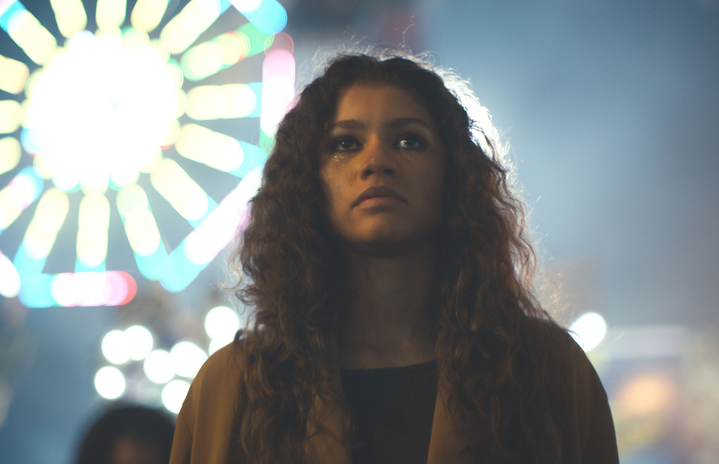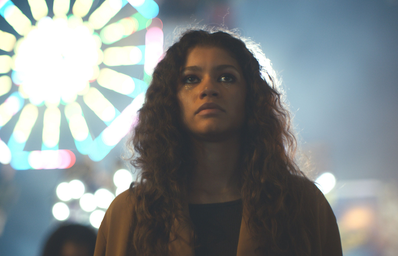Debuting in 2019, the American TV series, Euphoria, has quickly become the second most viewed show in HBO’s history, amassing an average of 16.3 million viewers. The show features a number of adult themes; nudity, sex, alcohol and drug addiction. However popular this series is, does Euphoria glorify the experience and understanding of addiction, Maddi asks.
Reflecting its name, Euphoria depicts the highs of indulging in addiction, where each character experiences and undertakes their own hedonistic voyage towards a different kind of addiction, whether it’s love, money or control, although the show most conspicuously focuses on 17-year-old protagonist Rue’s drug addiction.
Since premiering, Euphoria has received a plethora of responses ranging from praise for its impressive cinematography and acting, to criticism of the excessively mature scenes that have been inappropriately associated with the young characters. Whilst attractively posing as a show about high school students trying to navigate their lives into the world of adulthood, Euphoria risks justifying the characters’ anarchistic behaviour, subsequently sending out the wrong message to its impressionable viewers.
It’s therefore up for debate whether or not the show immorally depicts a glorified account of drug use, or whether it educationally vilifies this destructive behaviour.
By masking the harsh reality of addiction, Euphoria arguably dresses up serious issues in glitter and kaleidoscopic lighting, where the depiction of drug use in Season 1 is particularly rooted in the visual flair that accompanies the glamour of a TV series. The show’s aesthetic, casting and camera work are undoubtedly attractive, but the danger lies in whether this captivating cinematography is causing the content to appear attractive too. The very name of the show may mistakenly imply that addiction is euphoric, romanticising self-destruction.
Rue relies on drugs as a coping mechanism for her anxiety and depression – is it right to depict drug abuse as a form of escapism? Maddy constantly runs back to her abusive boyfriend Nate who epitomises toxic masculinity – do we want to teach young people that this is an acceptable relationship? Kat resorts to becoming a cam-girl for older men who repay her in gifts and money – should we be encouraging girls to exploit their bodies for profit?
The educational company, D.A.R.E, reports that Euphoria “chooses to misguidedly glorify […] drug use, addiction [and] violence”, dangerously and falsely presenting these destructive behaviours as “common in today’s world”. The show’s glamorous aesthetic therefore may overshadow the severity of such issues, presenting an erroneous glorification.
However at its core, Euphoria is still just a vessel of fictional entertainment.
The show will naturally present exaggerated artistry and stylised representations of what it depicts, still valuing education without compromising its foundational purpose to entertain. Each episode isn’t obliged to teach a moral lesson. The director, Sam Levinson, urged that “it’s crucial that television and film depict addiction in an honest way”, illustrating the highs and lows. In some ways we can appreciate how raw Euphoria really is.
It’s clear that Season 2 has placed greater emphasis on showing the distressing, intimate details of Rue’s overdose and withdrawal, meticulously dramatising the graphic nature of addiction and the devastating impact it has on her family and friends. Some of Euphoria’s most abrasive scenes even make for uncomfortable viewing, but by unmasking the issues behind the glitter and glamour, the show can deeply connect with the audience and essentially provide education and help.
By accentuating that addiction is a medical condition that needs to be appropriately treated with compassion and support, as well as the more obvious methods of rehab and medication, Euphoria is able to spark an important dialogue about controversial issues that need to be addressed and communicated, especially to a young audience. The show depicts that the longevity of drug abuse has done nothing but cause trauma for Rue and those close to her, condemning such behaviour.
Throughout the chills and thrills of Euphoria, an accurately encompassing documentation of addiction is presented. At times it can seem romanticised and superficially glossed over, but juxtaposing this with the hyper-realistic, uncomfortable depiction of what drug abuse is really like, addiction is evidently not glorified.
It’s easy to fixate on the charming aesthetic of the show but by demonstrating the harsh reality of addiction, Euphoria can be considered as a very influential and beneficial form of education for young people regarding the dangers of drug abuse.


